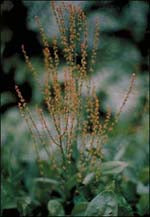
Blessed Thistle. Blessed thistle is used for digestive problems such as gas, constipation, and upset stomach. This herb is also used to treat liver and gallbladder diseases.

Burdock Root. Burdock root is a mild diuretic. It increases the production of both urine and sweat, potentially making it useful in treating swelling and fever. Burdock root might play a role in preventing liver damage caused by alcohol, chemicals, or medications. Antioxidants such as burdock may protect body cells from damage caused by oxidation.

Kelp. Kelp is a sea vegetable that is a concentrated source of minerals including: iodine, potassium, magnesium, calcium, and iron. Kelp as a source of iodine assists in making thyroid hormones, which are necessary for maintaining normal metabolism in all cells of the body. This increases energy levels and helps make it easier to maintain a healthy body weight.

Red Clover. Red clover is a source of many valuable nutrients including: calcium, chromium, magnesium, niacin, phosphorus, potassium, thiamine, and vitamin C. Red clover is also one of the richest sources of isoflavones. The isoflavones found in red clover have been studied for their effectiveness in treating some forms of cancer.

Sheep Sorrel including the root. Sheep sorrel with the root included is a rich source of oxalic acid, sodium, potassium, iron, manganese, phosphorous, beta carotene, and vitamin C. This essiac tea ingredient is a mild diuretic, mild antiseptic, and a mild laxative.

Slippery Elm Bark. Slippery elm bark has been used as a poultice for cuts and bruises as well as for aching joints. This herb is also used to alleviate sore throats and can be found in many throat lozenges. Since a sore throat and a cough are often linked, slippery elm bark has also been used in cough remedies. Slippery elm bark also regulates the elimination process of digestion, easing both constipation and diarrhea.

Turkish Rhubarb Root. Turkish rhubarb root purges the body of bile, parasites, and stagnated food in the gut by stimulating the gall duct to expel toxic waste matter. It has been shown to alleviate chronic liver problems by helping cleanse the liver. Rhubarb root improves digestion and helps regulate the appetite. It has also been shown to help heal ulcers, alleviate disorders of the spleen and colon, relieve constipation, and help heal hemorrhoids and bleeding in the upper digestive tract.

Watercress. Rich in Vitamin C, the bitter taste of watercress is thought to regulate the appetite and improve digestion. It can be used to alleviate nervous conditions, constipation, and liver disorders. Watercress is a popular cough and bronchitis remedy. It contains rhein, which appears to inhibit the growth of pathogenic bacteria in the intestines. It is believed that rhein is also effective against Candida albicans (yeast infection), fever and inflammation, and pain.
